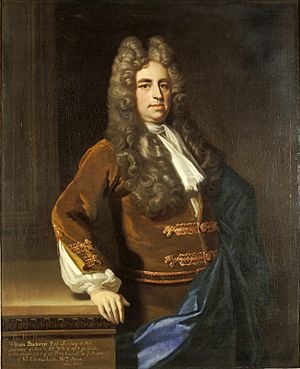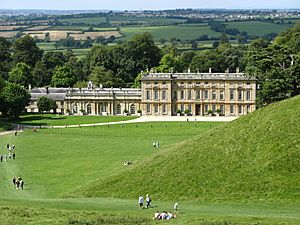William Blathwayt facts for kids
Quick facts for kids
William Blathwayt
|
|
|---|---|

Portrait by Michael Dahl
|
|
| Secretary at War | |
| In office August 1683 – 1704 |
|
| Monarch | James II |
| Preceded by | Matthew Locke |
| Succeeded by | George Clarke |
| Personal details | |
| Born | 1649 |
| Died | 16 August 1717 (aged 68) |
| Alma mater | Brasenose College, Oxford |
William Blathwayt (1649 – 16 August 1717) was an important English diplomat and government official. He was also a politician who served in the English and British parliaments from 1685 to 1710. Blathwayt helped create the War Office, which is a key part of the British government. He also played a big role in managing the English colonies in North America.
Contents
William Blathwayt's Early Life and Career
William Blathwayt was born in London in 1649. His family was well-off, with many merchants and lawyers. After his father passed away, his mother remarried. In 1665, he began studying law.
Starting in Diplomacy
Blathwayt started his career in diplomacy in 1668. His uncle, Thomas Povey, helped him get a job at the English embassy in The Hague. He then worked at embassies in Copenhagen and Stockholm. From 1672 to 1673, he traveled across Europe. He visited Sweden, Germany, Italy, Switzerland, and France. During his travels, he studied at Padua University in Italy.
Working for the Government
When Blathwayt returned to London, he started working for the government. From 1675 to 1679, he was an assistant secretary for trade and plantations. In 1678, he became a clerk for the Privy Council. This was a group of advisors to the King.
In 1679, he became the secretary of trade and plantations. This meant he was deeply involved in managing England's colonies in North America. In 1680, he became the first person to check royal money coming from America.
Becoming Secretary at War
In 1683, Blathwayt bought the job of Secretary at War. He held this important position until 1689. At first, this role was just a secretary to the army's leader. But Blathwayt made the job much bigger. He expanded it to include almost all parts of running the army. He basically created the War Office as a full government department. However, he didn't decide how wars were fought. That was handled by other government departments.
Parliamentary Role and Colonial Affairs
In 1685, Blathwayt was elected as a Member of Parliament for Newtown. He wasn't very active in Parliament at this time.
In 1686, he became a full-time clerk of the Privy Council. He also became the secretary for the Privy Council's committee on trade and colonies. This made him a very important person in American affairs. He helped set up the rules for the Province of Massachusetts Bay. This was a major English colony that later became the state of Massachusetts. Blathwayt worked hard to help trade grow in America. He was known for being very good at his job. A famous diarist, John Evelyn, said he was "very clever in business." In 1686, he married Mary Wynter.
Later Career and Retirement
In 1688, Blathwayt was a witness in a famous court case. After the Glorious Revolution, he lost his job as Secretary at War. But he got it back in May 1689 and kept it until 1704.
From 1693 to 1710, Blathwayt was a Whig Member of Parliament for Bath. In 1696, he became a Lord of Trade, a position he held until 1707.
Blathwayt retired in 1710 to his home at Dyrham Park. His wife had passed away in 1691. He lived there until he died on August 16, 1717. He was buried in the local churchyard.
William Blathwayt's Art Collection
William Blathwayt built a large and beautiful house called Dyrham Park near Bristol. He filled his home with many Dutch Old Masters paintings. He also decorated it with fancy fabrics and furniture. His family sold many of his artworks in 1765. However, some paintings have been bought back, and others are still at Dyrham Park today. Dyrham Park is now looked after by the National Trust. It is open for visitors to explore.
 | Anna J. Cooper |
 | Mary McLeod Bethune |
 | Lillie Mae Bradford |


